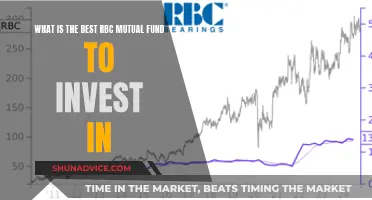
Mutual funds are a type of investment that pools money from multiple investors to purchase a diversified portfolio of stocks, bonds, or other securities. They are managed by professional money managers and provide individual investors with access to a wide range of assets, allowing for greater diversification and potentially lower risk. Mutual funds offer an affordable way to invest in a variety of assets, including domestic and international stocks, bonds, commodities, and more. They are also highly liquid, allowing investors to buy and sell shares at any time. While mutual funds provide a professionally managed investment option, they also come with fees and expenses that can impact overall returns. It is important for investors to carefully consider their investment goals, risk tolerance, and fees associated with mutual funds before making any decisions.
| Characteristics | Values |
|---|---|
| Definition | A mutual fund is a company that pools money from many investors and invests the money in securities such as stocks, bonds, and short-term debt. |
| Investor's role | Investors buy shares in mutual funds. |
| Ownership | Each share represents an investor’s part ownership in the fund and the income it generates. |
| Affordability | Most mutual funds set a relatively low dollar amount for initial investment and subsequent purchases. |
| Liquidity | Mutual fund investors can easily redeem their shares at any time, for the current net asset value (NAV) plus any redemption fees. |
| Management | Mutual funds are run by professional money managers who decide which securities to buy (stocks, bonds, etc.) and when to sell them. |
| Investment strategy | Mutual funds offer a wide variety of investment strategies and styles. |
| Investment access | Mutual funds let you access a wide mix of asset classes, including domestic and international stocks, bonds, and commodities. |
| Transaction costs | Mutual funds' transaction costs are typically lower than what you would pay as an individual investor. |
| Types | There are many types of mutual funds, including stock, money market, bond, and target-date funds. |
| Earning methods | Mutual funds offer three ways to earn money: dividend payments, capital gains distributions, and increased NAV. |
What You'll Learn

Mutual funds are a collection of investments from one or more asset classes
When you buy a mutual fund, you are pooling your money with many other investors, allowing you to invest in a variety of assets at a relatively low cost. Mutual funds can invest in stocks, bonds, real estate, derivatives, and other securities. The fund's portfolio is managed by a professional manager who decides which securities to buy and sell, aiming to benefit from economies of scale and potentially lower transaction costs.
The value of a mutual fund changes as the value of its underlying investments fluctuates. The level of risk associated with a particular fund depends on its investments. Mutual funds offer three ways to earn money: dividend payments, capital gains distributions, and increased net asset value (NAV).
There are different types of mutual funds, including stock funds, bond funds, money market funds, and target-date funds. Stock funds can be further categorized into growth funds, income funds, index funds, and sector funds. Bond funds, which carry higher risks than money market funds, can include government bonds, corporate bonds, and other debt instruments. Money market funds invest in low-risk, short-term debt instruments, while target-date funds hold a mix of stocks, bonds, and other investments, gradually shifting their allocation over time.
Mutual funds provide an affordable way to diversify your investment portfolio, offering a wide range of investment strategies and styles. They are a popular choice for investors seeking a balanced mix of assets with the guidance of professional fund managers.
Investing Now: Choosing the Right Funds for Your Portfolio
You may want to see also

They are managed by professionals
Mutual funds are managed by professional money managers who decide which securities to buy and when to sell them. These managers are legally obligated to follow the fund's stated mandate and to work in the best interest of the shareholders. They use research and skillful trading to monitor the fund's portfolio on an ongoing basis.
Mutual funds are subject to industry regulations that ensure accountability and fairness for investors. The component securities of each fund can be found across many platforms, and fund managers are required to disclose information about the fund's investment objectives, risks, performance, and expenses.
The benefit of professional management is that it provides investors with a relatively inexpensive way to access a full-time manager who can make and monitor investments. Mutual funds require much lower investment minimums, making them a low-cost way for individual investors to benefit from professional money management.
Actively managed funds are overseen by portfolio managers who select securities they believe will outperform benchmarks. These funds typically strive to beat the market and are usually more expensive. In contrast, index funds are designed to track a specific index rather than beat it, and they tend to be a more affordable option.
While professional management can be advantageous, it's important to consider the fees associated with mutual funds. These fees can impact overall returns, and even small differences in fees can lead to large differences in returns over time. Therefore, it's crucial for investors to carefully review the fund's prospectus and consider their investment objectives and risk tolerance.
Retirement Fund Investment: Choosing the Right Option
You may want to see also

They are a popular choice for investors
Mutual funds are a popular choice for investors for several reasons. Firstly, they offer professional management, meaning that fund managers conduct research and monitor the performance of the fund, so investors don't have to. This also means that investors benefit from the expertise of these professionals without having to pay high fees for their services.
Secondly, mutual funds are an affordable way to diversify one's portfolio. They allow investors to pool their money with others to buy a wide mix of asset classes, including stocks, bonds, commodities, and more. This diversification helps to lower the risk of losing money, as it ensures that the investments are spread across a range of companies and industries.
Thirdly, mutual funds are known for their liquidity. Investors can easily buy and sell mutual fund shares at any time, making them a flexible investment option.
Lastly, mutual funds are easily accessible to investors. Many banks and brokerage firms offer their own mutual funds, and investors can also access thousands of third-party funds. This accessibility, combined with their affordability, makes mutual funds a popular choice for those seeking a simple way to invest in a variety of assets.
IRA Investment Options: Mutual Funds or ETFs?
You may want to see also

They are an affordable way to diversify your portfolio
Mutual funds are an affordable way to diversify your portfolio. They are a collection of investments from one or more asset classes, allowing you to invest in a variety of assets at a relatively low cost.
Mutual funds pool money from multiple investors, which is then used to purchase a diversified portfolio of stocks, bonds, or other securities. This provides individual investors with access to a professionally-managed portfolio and the benefits of economies of scale, while also spreading risk across multiple investments.
The diversification offered by mutual funds is a significant advantage. By investing in a range of companies and industries, mutual funds lower the risk of losing money if a single company fails. This diversification can be achieved more quickly and cheaply through a mutual fund than by purchasing individual securities.
Mutual funds are also highly liquid, allowing investors to redeem their shares at any time for the current net asset value (NAV) plus any redemption fees. The transaction costs of mutual funds are typically lower than what an individual investor would pay, as funds buy and sell large amounts of securities at once.
Furthermore, mutual funds are easily accessible to investors. Many banks and brokerage firms offer their own line of proprietary mutual funds, as well as access to thousands of third-party funds. This makes it convenient for investors to find and invest in mutual funds that match their goals and budget.
Overall, mutual funds provide an affordable way to diversify your portfolio by giving you access to a wide range of investments and helping to reduce risk through pooling and professional management.
Index Funds: How Much Should You Invest?
You may want to see also

They can be actively or passively managed
Mutual funds can be actively or passively managed. Actively managed funds are overseen by portfolio managers who select securities they believe will outperform benchmarks. These funds typically strive to beat the market and are therefore more expensive. Passive funds, on the other hand, are designed to track a specific index, such as the S&P 500, rather than beat it. This passive strategy requires less research, and so fewer expenses are passed on to investors through fees. Passive funds are also known as index funds.
Actively managed funds are more expensive because they are overseen by portfolio managers who must spend time and resources researching and selecting securities. These funds are designed to beat the market, and so they require more active management and incur higher costs. Passive funds, on the other hand, are designed to mirror the performance of a specific index. This requires less active management and results in lower costs, which are passed on to investors in the form of lower fees.
Actively managed funds are often more expensive than passive funds, but this doesn't always translate to better performance. In fact, it can be difficult for actively managed funds to outperform the market over the long term. Passive funds, on the other hand, often outperform their active counterparts, offering the rare combination of lower costs and better performance.
When deciding between active and passive funds, investors should consider their investment goals, time horizon, and risk appetite. Active funds may be more suitable for investors who are comfortable with higher fees and are seeking to beat the market. Passive funds, on the other hand, may be more appropriate for those who prioritise cost-efficiency and are content with market returns.
In summary, mutual funds can be actively or passively managed, with actively managed funds striving to beat the market and passively managed funds aiming to track it. Actively managed funds tend to be more expensive, while passive funds offer lower fees and sometimes better performance. Investors should carefully consider their investment objectives and risk tolerance when deciding between these two types of funds.
Private Equity Funds: Impact Investing Strategies Revealed
You may want to see also
Frequently asked questions
A mutual fund is an investment vehicle that pools money from multiple investors to purchase a diversified portfolio of stocks, bonds, or other securities. It is managed by professional money managers and provides investors with access to a wide range of assets.
Mutual funds offer several benefits, including professional management, diversification, affordability, and liquidity. They provide investors with access to a diversified portfolio of assets, which helps to reduce risk. Mutual funds also have relatively low initial investment requirements and investors can easily redeem their shares at any time.
There are several types of mutual funds, including money market funds, bond funds, stock funds, and target-date funds. Each type has different features, risks, and rewards. Money market funds are considered low-risk, while bond funds aim for higher returns and carry higher risks. Stock funds invest in corporate stocks and can be further categorized into growth funds, income funds, index funds, and sector funds. Target-date funds hold a mix of stocks, bonds, and other investments, gradually shifting their allocation over time.
Mutual funds offer three main ways to earn money: dividend payments, capital gains distributions, and increased net asset value (NAV). Dividend payments are made when a fund earns income from dividends on stocks or interest on bonds. Capital gains distributions occur when the fund sells securities that have increased in price, resulting in a capital gain that is distributed to investors. Increased NAV means that the market value of the fund's portfolio has increased, leading to a higher value of the fund and its shares.
Mutual funds carry the risk of losing some or all of the invested money as the securities held by the fund can decrease in value. The value of dividends or interest payments may also change with market conditions. Additionally, mutual funds may have higher fees and expenses that can impact overall returns. It is important for investors to carefully consider the risks and fees associated with mutual funds before investing.







